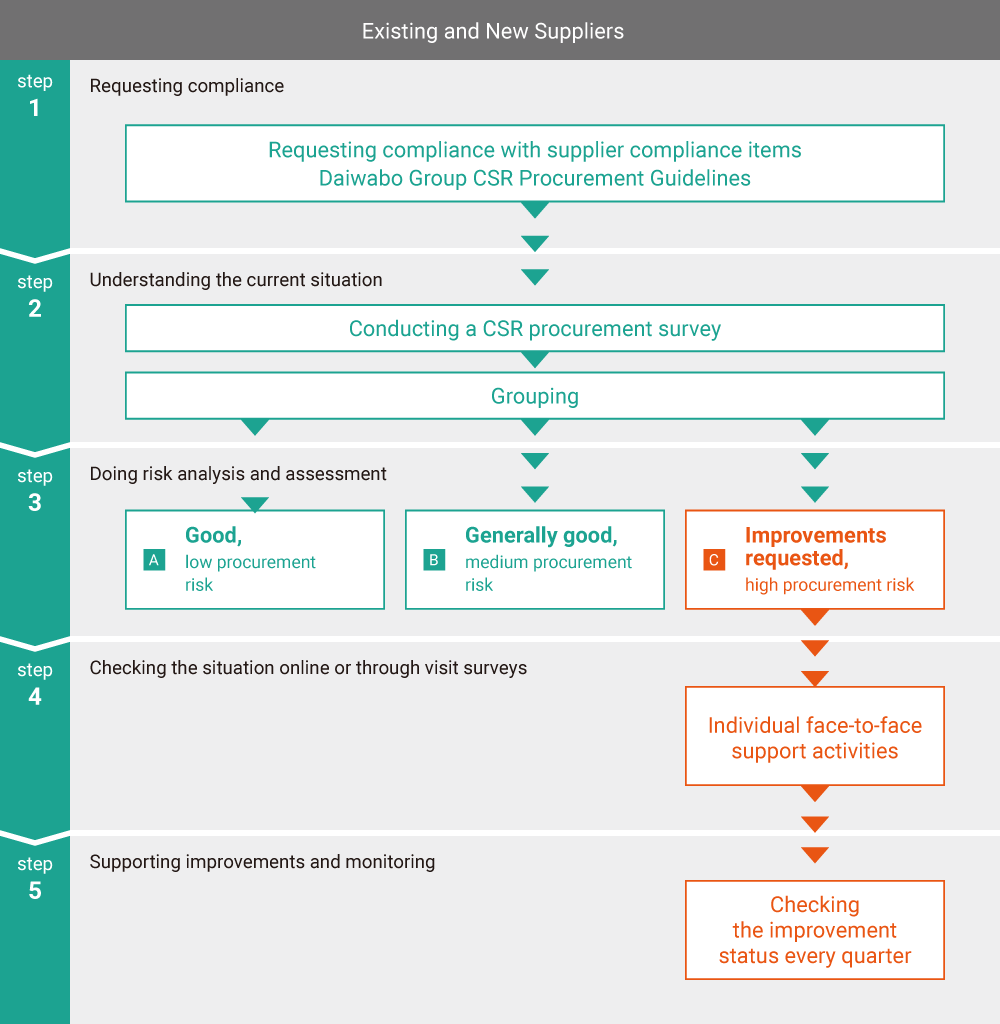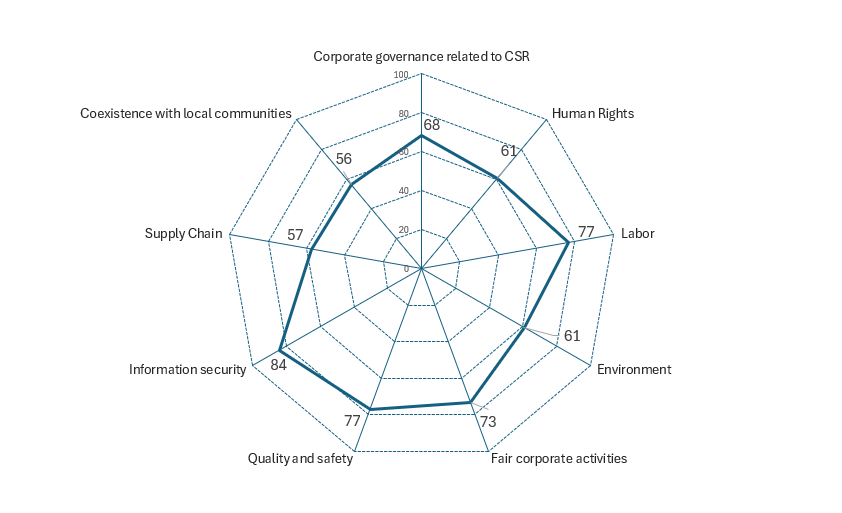The Daiwabo Group* has adopted the management philosophy of “creating a future that benefits society and the global environment.” The philosophy of putting the customer first is at the core of our management, and as a responsible member of the global supply chain, we recognize that efforts are needed to resolve human rights and environmental issues not just in the Daiwabo Group but across the supply chain. As such, we will endeavor to identify issues in relevant parts of the supply chain through our business activities, and ensure a stable supply of sustainable products and raw materials.
* The “Daiwabo Group” refers collectively to Daiwabo Holdings Co., Ltd. and our consolidated subsidiaries.
The Daiwabo Group seeks the understanding and cooperation of suppliers and other business partners in the following areas, and will work with them to promote sustainability initiatives.
The Daiwabo Group CSR Procurement Guidelines were established in June 2023 as a tool for promoting responsible procurement activities that take sustainability into consideration. The Daiwabo Group CSR Procurement Guidelines will be published online in order to help suppliers understand our Group’s policies, and efforts will be made to disseminate them when requesting CSR procurement questionnaires.
If it becomes clear that our business activities are facilitating environmental issues, human rights violations, or other issues in the supply chain, we will take appropriate steps to rectify the situation.
We will endeavor to disclose information related to the above in a timely and appropriate manner.
The Daiwabo Group cooperates with suppliers to promote procurement that takes into consideration compliance, reduction of environmental impact, human rights, labor, safety and health, and other issues. We continuously monitor and request our suppliers’ CSR initiatives. Specifically, we ask suppliers to complete the CSR procurement questionnaire and comply with the Daiwabo Group CSR Procurement Guidelines.
In order to ensure responsible procurement, we also continuously provide training on the group philosophy, Daiwabo Group Charter of Corporate Behavior, procurement policies, and related laws and regulations to employees in charge of procurement.
The Daiwabo Group regards its suppliers as valued partners working together to achieve shared goals. We are committed to deepening mutual understanding and strengthening cooperative relationships, while enhancing transparency and efficiency across the entire supply chain.

At the Daiwabo Group, we have established the Daiwabo Group CSR Procurement Guidelines in order to understand supply chain issues related to our business activities and to ensure a stable supply of sustainable products and raw materials. We have published the Guidelines on our website and ask for the understanding and cooperation of all our suppliers to proactively implement these Guidelines when requesting a CSR procurement survey.
The Daiwabo Group conducts CSR procurement surveys of its major suppliers to identify potential and actual risks in the supply chain and to improve transparency throughout the supply chain. As a result of the survey, we evaluate risks related to the environment, human rights, labor, health and safety, and other social issues, and for those suppliers that are identified as requiring improvement, we request individual improvement and follow-up.
The CSR procurement survey covers suppliers that account for the top 90% of the total transaction value and are considered to have a significant financial impact on the Group, as well as those that supply critical products or raw materials to the Group, those that supply irreplaceable items.
As part of our supply chain management, we use the Global Compact Network Japan’s (GCNJ) CSR Procurement Self-Assessment Questionnaire (SAQ) for our surveys.
Reference: CSR Procurement Self-Assessment Questionnaire Tool
Survey items: a total of 114 questions
We define a state in which a supplier’s efforts regarding CSR—such as human rights, labor practices, and environmental initiatives—are insufficient, and where violations of relevant laws and regulations are likely to have a significant negative impact on our business activities, as “High Risk Related to Sustainability.”
Based on the results of our CSR procurement survey, we established criteria and categorized suppliers into three groups (see table below). Suppliers with a score rate of less than 60% are classified as Group C, and we conduct individual awareness-raising activities and provide support. Through dialogue and collaboration, we aim to reduce social and environmental risks across the entire supply chain and enhance sustainability.
If, after sufficient consultation, understanding cannot be obtained and improvements are not promoted, we will consider reviewing the business relationship. Furthermore, if there is a serious violation of our Group’s CSR Procurement Guidelines, we will consider suspending transactions.
|
Group |
Scoring Rate |
Description |
Daiwabo Group’s efforts |
|
Group A |
Total: 80% or more |
CSR initiatives are very good |
Responding to inquiries from suppliers |
|
Group B |
Total: 60% to less than 80% |
A general effort has been made |
Responding to inquiries from suppliers |
|
Group C |
Total: Less than 60% |
CSR initiatives are inadequate |
Request improvements from suppliers on an individual basis and follow up on their activities |
Targets and Results
The Daiwabo Group has set the following KPIs through these activities to deepen mutual understanding and strengthen cooperative relationships, as well as to maintain supply chain quality and enhance the effectiveness of our initiatives.
|
KPI |
Target |
Results |
|||
|
FY2022 |
FY2023 |
FY2024 |
Total |
||
|
CSR procurement questionnaire response rate |
Over 90% |
100% |
96% |
89% |
93% |
|
Group C supplier support rate |
100% |
100% |
100% |
100% |
100% |
Since FY2022, we have conducted CSR procurement surveys and received responses from a total of 272 suppliers, including 14 new suppliers (5.1%) and 258 existing suppliers. Approximately 86% of the suppliers surveyed were rated as “Good” or “Generally Good.”
|
Group |
Scoring Rate |
Total |
Description |
|
Group A |
Total: 80% or more |
135 companies (50%) |
CSR initiatives are very good |
|
Group B |
Total: 60% to less than 80% |
99 companies (36%) |
A general effort has been made |
|
Group C |
Total: Less than 60% |
38 companies (14%) |
CSR initiatives are inadequate |
Assessment Scoring Rates
|

Analysis of High-Scoring Areas
The three areas of “Information Security”, “Quality and Safety”, and “Labor” demonstrated high performance. This is largely due to progress in alignment with international frameworks such as ISO 26000 (consumer issues and labor practices) and compliance with customer and regulatory requirements, resulting in relatively well-established policies, organizational structures, training programs, and corrective mechanisms.
Analysis of Low-Scoring Areas
“Supply Chain” scored relatively low because requirements are still being clarified amid ongoing discussions on revisions and simplification of recent European regulatory frameworks (such as CSRD and CSDDD). In addition, implementing risk assessment, corrective actions, and grievance mechanisms across multi-tier suppliers requires continuous resource allocation, which remains challenging for many small and medium-sized enterprises.
“Coexistence with local communities” also scored lower, as ISO 26000 is a guidance standard rather than a legal obligation, making it difficult to standardize KPIs or measure return on investment. Designing integration and co-creation with core business activities remains a key challenge.
Future Initiatives
The Daiwabo Group will continue to promote responsible business practices across the entire supply chain and contribute to a sustainable society by sharing CSR information platforms, providing various support tools (such as policy and organizational structure guidelines), and offering individual consultations.
Including past surveys, we have provided individual, in-person support and other assistance to a total of 50 Group C suppliers. As a result, 12 suppliers have improved to Group B or higher, and we will continue to provide support for the remaining 38 suppliers to achieve further improvements.
The Daiwabo Group believes that respect for human rights and environmental conservation are indispensable elements in the supply chain for stable and sustainable procurement. We have declared that we will work toward building a supply chain that takes human rights and the environment into consideration in accordance with the Daiwabo Group CSR Procurement Guidelines. And we require our suppliers to take measures such as respecting human rights, prohibiting discrimination, avoiding complicity in or encouraging human rights violations, prohibiting inhumane treatment, applying fair working hours, prohibiting forced labor, and providing fair wages.
When selecting new suppliers or expanding business operations, we utilize SAQ to comprehensively evaluate and prevent risks related to bribery and corruption. This includes prohibiting bribery, preventing improper exchange of benefits, eliminating relationships with antisocial forces, avoiding unfair trade practices, and monitoring political contributions to politicians or political organizations.
The products manufactured and sold by the Daiwabo Group contain materials derived from a variety of minerals. These materials are procured from origins around the world via diverse supply chains, some of which are known to be involved in mineral mining, smelting, and other processing sites where armed groups have been involved, as well as serious human rights violations and environmental destruction. We recognize that one of our corporate social responsibilities is to be aware of conflict zones and other high-risk areas and to avoid using materials supplied by businesses that pose a high risk to human rights and the environment in these areas. In accordance with the CSR Procurement Guidelines, the Daiwabo Group stipulates that we purchase and use raw materials that are free from conflict or crime (our efforts against conflict minerals). We prevent the purchase and use of minerals such as tin, tantalum, tungsten, gold, and cobalt related to conflicts and human rights violations or produced in conflict-afflicted and high-risk areas, and we also investigate and confirm with business partners.
Daiwabo Information System Co., Ltd. in the IT infrastructure distribution business (hereinafter referred to as “DIS”) has further strengthened and is continuously working to build better relationships with its business partners and to improve the soundness of its transactions. The company has made a “Partnership Creation Declaration” to promote the creation of new value Daiwabo Information System Co., Ltd. in the IT infrastructure distribution business (hereinafter referred to as “DIS”) has further strengthened and is continuously working to build better relationships with its business partners and to improve the soundness of its transactions. The company has made a “Partnership Creation Declaration” to promote the creation of new value throughout the supply chain while responding to social needs.
-
 Partnership Creation Declaration
(217KB)
Partnership Creation Declaration
(217KB)
If natural disasters such as heavy rain and floods increase due to climate change, logistics centers may be forced to suspend operations and products may arrive late. While continuing to implement BCP measures, we will also continue to minimize the impact of natural disasters by hedging risks with insurance and by dispersing logistics bases to reduce risks, as we have done in the past, and ensure the stability of the supply chain.
DIS is committed to promoting environmentally friendly products on a daily basis by purchasing environmentally friendly products and products from suppliers that have obtained ISO 14001 certification, and by recommending and proposing products and services that help reduce environmental impact to customers through daily sales activities. It is also working to popularize environmentally friendly products by improving searchability for environmentally friendly IT-related products on the iDATEN e-commerce system.